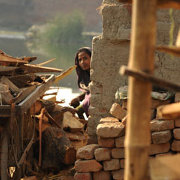 |
| (Image courtesy Bright Hope International) |
The statistics defy belief. Three years ago, human rights watchers said more than 1.2 million children in India were sold into prostitution, and as many as 100 million people in India are involved in trafficking-related activities. That number has only gone up.
The most likely victims of human trafficking are those living on less than a $1 a day. C.H. Dyer with Bright Hope International notes that, "People that are in extreme poverty will go to great measure to find security, food, just the basics of life."
Desperation drove local churches to Bright Hope to ask for help. "'We know there's a lot of prostitution and a lot of young girls that are forcibly put into prostitution in our community. What can we do to make a difference?'"
Bright Hope developed a network of churches in India to raise awareness and build strategic partnerships to be a part of the solution. The three-pronged approach included awareness, rescue, and rehabilitation.
An anti-trafficking program developed that included training for those who were involved in the rescues and rehabilitation programs for the rescued. The program hasn't been without its challenges. Building trust takes time. "Getting them out of the situation, working with the local authorities, working with the police to gain their confidence and the ability to go into these brothels and pull out the minors and offer the older women the chance to come out: this is all new in this rescue area."
It's a responsibility they don't take lightly with so much at stake, says Dyer. "You take your time, you pray, and you get the advice of those who have gone before you."
A proven track record...what does that mean for a rescue program? Dyer explains, "You'll see the people start to say, 'This works for people. Education, the Scriptures, a strong local church, job training."
In fact, the success rate has been encouraging. "The agencies we're working with have documented lower rates of prostitution in those communities where they have done this with good planning, and that's what we're bringing to this: proven solutions and a proven God who changes lives."
However, a successful rescue means there's an angry pimp or gang lord. "Certain pastors and leaders that are involved with our team have gotten death threats already and threats of violence against them."
Taking on human trafficking means a church is entering the spiritual fray. Dyer says often, there are drugs or idolatry involved. "It is dangerous. It is the front lines against evil. We need to partner with them in prayer specifically, that the power of the Lord would come upon them and protect them and lead them as they do these good works in His name."
Then, there's the question of whether slave rescues actually perpetuate the cycle of slavery. In cases where people were rescued from slavery in Ghana, it was found that many of them found their way back in later, or new slaves were taken. Dyer says that was the first question they asked themselves before embarking on this path: "Are you going to stir the pot and make things worse, or are you really going to get to some of the solutions that can change lives?"
Rehabilitation is focused on healing through professional Biblical counseling to regain strength, hope, and faith in God and His ability to restore them. Opportunities to earn a liveable wage must be given. Through job skills training, girls can have well-paying jobs as they rebuild their lives. Dyer goes on to explain that "These kinds of programs really can help people rise above their economic and spiritual situation. So we can create a pathway where some more will follow."
That being said, the team is gearing up for another major foray. "In just a few weeks, we're going to see this all ramp up to take even more girls out. My real desire today is that everybody who hears our voices would pray for the churches involved in human trafficking around the world."
No comments:
Post a Comment